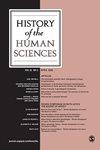The pincer movement of The Idea of a Social Science: Winch, Collingwood, and philosophy as a human science
IF 0.5
2区 历史学
Q2 HISTORY & PHILOSOPHY OF SCIENCE
引用次数: 0
Abstract
This article argues that, in order to understand Peter Winch's view of philosophy, it is profitable to read him together with R. G. Collingwood's philosophy of history. Collingwood was both an important source for Winch and a thinker engaged in a closely parallel philosophical pursuit. Collingwood and Winch shared the view that philosophy is an effort to understand the various ways in which human beings make reality intelligible. For both, this called for rapprochement between philosophy and the humanities. Like Collingwood, Winch wanted to reformulate philosophy as a form of human science. Both thinkers advanced a conception of logic where the validity of judgements, propositions, and thought are dependent on their function as instruments in human dialogue. In their treatments of logic, Winch and Collingwood were fleshing out their idea that questions concerning human meaningful behaviour also tie back to the question of what philosophical analysis is about. There is a deep connection between two main issues in both Collingwood's and Winch's writings: on the one hand, the need for ‘internal’ understanding of how human beings relate to reality, and on the other hand, their critique of the idea of logic as a self-sufficient system, external to historically embedded forms of life. At the core of their shared vision there was a comprehensive critique of metaphysical realism.社会科学思想的钳形运动:温奇、科林伍德与哲学作为一门人文科学
本文认为,为了更好地理解温奇的哲学观,将温奇与科林伍德的历史哲学结合起来读是有益的。科林伍德既是温奇思想的重要来源,也是一位有着相似哲学追求的思想家。科林伍德和温奇都认为,哲学是一种理解人类使现实变得可理解的各种方式的努力。对于两者来说,这都需要哲学和人文学科之间的和解。和科林伍德一样,温奇想把哲学重新表述为一种人文科学。两位思想家都提出了一种逻辑概念,即判断、命题和思想的有效性取决于它们作为人类对话工具的功能。温奇和科林伍德对逻辑的处理充实了他们的观点,即有关人类有意义的行为的问题也与哲学分析是关于什么的问题有关。在科林伍德和温奇的作品中,两个主要问题之间存在着深刻的联系:一方面,需要“内在”理解人类与现实的关系,另一方面,他们对逻辑作为一种自给自足的系统的观点的批评,这种系统外部于历史上嵌入的生活形式。他们共同愿景的核心是对形而上学现实主义的全面批判。
本文章由计算机程序翻译,如有差异,请以英文原文为准。
求助全文
约1分钟内获得全文
求助全文
来源期刊

History of the Human Sciences
综合性期刊-科学史与科学哲学
CiteScore
1.60
自引率
11.10%
发文量
31
审稿时长
>12 weeks
期刊介绍:
History of the Human Sciences aims to expand our understanding of the human world through a broad interdisciplinary approach. The journal will bring you critical articles from sociology, psychology, anthropology and politics, and link their interests with those of philosophy, literary criticism, art history, linguistics, psychoanalysis, aesthetics and law.
 求助内容:
求助内容: 应助结果提醒方式:
应助结果提醒方式:


